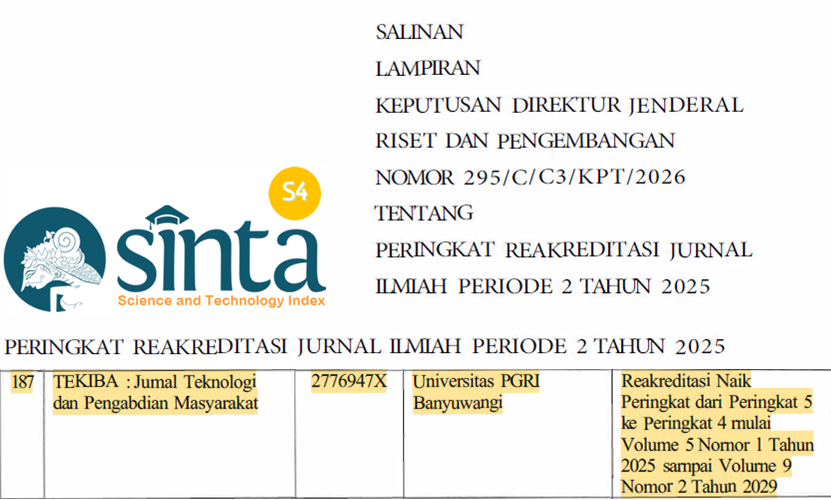Metode Mengurangi Kecanduan Gadjet dan Meningkatkan Prestasi Dengan Mengenal Gaya Belajar Anak
DOI:
https://doi.org/10.36526/tekiba.v4i1.3692Keywords:
Addiction Gadgets, Parenting, Education LearningAbstract
Addiction to gadgets or devices can occur in children or adults. Addiction can happen to anyone, whether they are children or adults. So, if someone becomes addicted to gadgets. The cause of gadget addiction is the habit of interacting without rules, leading people to increasingly feel the pleasure and addiction of interacting in the virtual world. Gadget addiction is very dangerous when experienced by children because it poses problems for them including a lack of socialisation with friends as they already have virtual friends, not communicating with those around them, and health issues such as eyesight problems that can affect a child's emotional stability. From these issues, it is necessary to educate parents to always accompany and limit their children while playing with gadgets. Many parents do not understand how to support their children while playing with gadgets, which is one of the challenges faced by parents at Khodijah 112 Dadapan Kindergarten. Therefore, it is important to raise awareness among parents about how to support their children so that they do not become addicted to gadgets and how parents can understand their children's learning methods to improve their academic performance.
References
N. Yona Sidratul Munti and D. Asril Syaifuddin, “Analisa Dampak Perkembangan Teknologi Informasi Dan Komunikasi Dalam Bidang Pendidikan,” J. Pendidik. Tambusai, vol. 4, no. 2, pp. 1799–1805, 2020.
J. Kristiyono, “Budaya Internet: Perkembangan Teknologi Informasi Dan Komunikasi Dalam Mendukung Penggunaan Media Di Masyarakat,” Scriptura, vol. 5, no. 1, pp. 23–30, 2015, doi: 10.9744/scriptura.5.1.23-30.
D. Setiawan, “Dampak Perkembangan Teknologi Informasi dan Komunikasi Terhadap Budaya Impact of Information Technology Development and Communication on Culture,” Simbolika, vol. 4, no. 1, pp. 62–72, 2018.
A. Abdullah, “Analisis Pengetahuan Pinjaman Online Pada Masyarakat Surakarta,” JESI (Jurnal Ekon. Syariah Indones., vol. 11, no. 2, p. 108, 2021, doi: 10.21927/jesi.2021.11(2).108-114.
J. Marpaung, “Pengaruh Penggunaan Gadget Dalam Kehidupan,” KOPASTA J. Progr. Stud. Bimbing. Konseling, vol. 5, no. 2, pp. 55–64, 2018, doi: 10.33373/kop.v5i2.1521.
S. Masthura, M. I. S, and A. S. Renila, “Hubungan Penggunaan Gadget Dengan Perkembangan Psikososial Anak Usia Sekolah di SD Negeri 1 Kota Banda Aceh,” J. Aceh Med., vol. 2, no. 1, pp. 171–175, 2018.
N. Manado, “Hubungan penggunaan,” vol. 3, no. April, pp. 1–6, 2015.
M. Limbong, “Hubungan Penggunaan Gadget Dengan Prestasi Belajar Mahasiswa Di Akademi Keperawatan Surya Nusantara Pematangsiantar,” Jurkessutra (jurnal Kesehat. Surya Nusantara), vol. 8(2), pp. 122–130, 2020.
N. M. Rini, I. A. Pratiwi, and M. N. Ahsin, “Dampak Penggunaan Gadget Terhadap Perilaku Sosial Anak Usia Sekolah Dasar,” J. Educ., vol. 7, no. 3, pp. 1236–1241, 2021, doi: 10.31949/educatio.v7i3.1379.
K. B. Syariah and G. Ilmu, “Pemanfaatan Media Gadjet Sebagai Teknologi Pembelajaran” sep 2016, pp.1–6.
Nurhayati, “Penggunaan Teknologi Gadget Sebagai Media Pembelajaran Pada Anak Usia Dini Di Raudhatul Atfhal Al-Ikhlas Kota Singkawang,” J. Ilmu Pendidik., vol. 1, no. 3, pp. 485–500, 2023.
A. Firda, “Media Online Utilization as Community’s Social Interaction,” J. Penelit. Pers dan Komun. Pembang., vol. 18, no. 2, pp. 171–184, 2014.
L. Arini, N. R. Rizqi, and Y. N. Harahap, “Pentingnya Pembatasan Penggunaan Gadget Untuk Meningkatkan Minat Belajar Anak,” JALIYE J. Abdimas, Loyal. dan Edukasi, vol. 1, no. 1, pp. 8–13, 2022, doi: 10.47662/jaliye.v1i1.247.
R. Hidayati, “Peran Orang Tua : Komunikasi Tatap Muka Dalam Mengawal Dampak Gadget Pada Masa Golden Age,” SOURCE J. Ilmu Komun., vol. 5, no. 2, pp. 1–10, 2020, doi: 10.35308/source.v5i2.1396.
H. A. Tamsil, ““Permasalahan Penggunaan Gadget Pada Tumbuh Kembang Anak Usia Dini di Masa Pandemi COVID-19,” Jendela PLS, vol. 6, no. 1, pp. 44–49, 2021, doi: 10.37058/jpls.v6i1.3140.
T. Penyusun, N. Akademik, P. Daerah, and W. Kebangsaan, “Pendidikan Pancasila Dan Wawasan Kebangsaan,” 2020.
E. H. Tyas, Menggapai Mimpi Melalui Entrepreneurship. 2019.
S. Widayani, “Pembentukan Karakter Remaja Melalui Pola Asuh Demokratis Untuk Mencegah Kecanduan Gadget di Era Revolusi Industri 4.0,” Pros. Konf. Pendidik. Nas., pp. 276–281, 2020.
D. Wulandari and T. Lestari, “Pengaruh gadget terhadap perkembangan emosi anak,” J. Pendidik. Tambusai, vol. 5, no. 1, pp. 1689–1695, 2021, [Online]. Available: https://jptam.org/index.php/jptam/article/view/1162?articlesBySameAuthorPage=2
V. Elvionita, “Karakteristik Komunikasi Interpersonal Orang Tua dan Anak dalam Upaya Mengatasi Kecanduan Game Online pada Anak,” Skripsi, 2022.
Downloads
Published
Issue
Section
License
Copyright (c) 2024 Muhammad Zainal Roisul Amin, Adi Mulyadi, Lestyo Wulandari, Bambang Sri Kaloko

This work is licensed under a Creative Commons Attribution-ShareAlike 4.0 International License.










